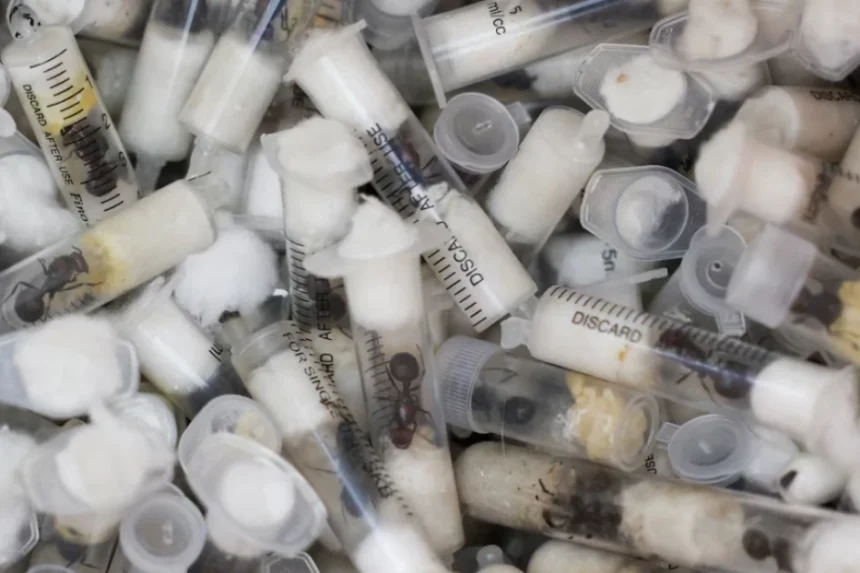Four suspects—two Belgians, a Vietnamese national, and a Kenyan accomplice—have admitted to attempting to smuggle thousands of live queen ants out of Kenya, popping the lid on a shadowy and lucrative black market for exotic insects.
The suspects were apprehended at Nairobi’s Jomo Kenyatta International Airport by Kenya Wildlife Service (KWS) officers on Tuesday, who discovered roughly 5,000 queen ants—including the rare Messor cephalotes, or Giant African Harvester Ant—concealed inside more than 2,200 modified test tubes and syringes.
The elaborate setup, designed to sustain the ants for months and evade detection, revealed a meticulously planned operation.
“This was not opportunistic. It was premeditated, systematic, and sophisticated,” KWS said in a statement, hailing the seizure as a critical breakthrough in Kenya’s fight against biopiracy. The accused remain in custody pending sentencing, with their next court appearance set for April 23.
The case has peeled back the curtain on an obscure but booming illegal trade: the trafficking of rare ants.
Once a niche pastime for hobbyists, ant-keeping has morphed into a thriving underground industry in Europe and Asia, where collectors shell out thousands for exotic queens to cultivate colonies in custom formicariums—specialized enclosures that allow enthusiasts to study the insects’ complex social structures.
Among collectors, Messor cephalotes reigns supreme. With queens stretching up to 24mm and flaunting striking red-and-black hues, the species is coveted for both its visual appeal and intricate colony behavior.
Demand is so high that UK-based retailer AntsRUs, which currently lists the species as “sold out,” has previously priced individual queens at nearly Ksh. 17,127.
The illicit trade in rare queen ants has flourished on various online platforms, where sellers and buyers operate with varying degrees of secrecy.
On AntsCanada, a popular forum and marketplace for ant enthusiasts, listings for rare African and Asian queen ants routinely appear, with prices ranging from USD 50to500 ( between Ksh. 6000 to Ksh.65k) per specimen depending on the species and availability.
These transactions often occur under the guise of legal trade, though many lack proper documentation.,
More covert sales take place through eBay and specialized Facebook groups, where sellers use coded language to avoid detection.
Recent transactions show Messor cephalotes queens commanding between USD 80and 200 each, with sellers frequently claiming the ants are “captive-bred” to circumvent wildlife regulations.
The most shadowy deals, however, unfold on dark web forums, where anonymity is guaranteed. Here, bulk purchases are common—such as lots of 10 queen ants for $1,000 (Ksh.130k)—with shipments deliberately mislabeled as harmless goods to bypass customs inspections
Authorities estimate the seized ants’ street value at over 1 million Kenyan shillings—a fraction of the sums tied to ivory or rhino horn, but with ecological stakes just as high. Queen ants are the linchpin of their colonies; their removal can devastate local populations, disrupt ecosystems, and even pave the way for invasive species abroad.
“This case marks a shift in trafficking trends—from charismatic megafauna to lesser-known yet ecologically vital species,” KWS noted. “Kenya’s biodiversity is not up for grabs, no matter the size of the organism.”
While some ant-keepers operate out of scientific curiosity, others run commercial breeding ventures that exploit rare species for profit. The line between hobby and environmental crime, experts warn, is increasingly thin.
In court, Belgian national David Lornoy, one of the accused, struck a remorseful tone. “We didn’t come here to break any laws. It was stupidity—and an accident,” he told the judge. Kenyan officials, however, remain unmoved.
To them, this was no accident. It was a calculated plunder of Kenya’s natural heritage—and proof that even the tiniest creatures are now ensnared in the global wildlife trafficking web.



